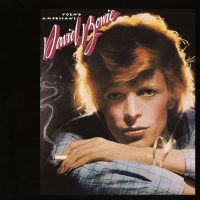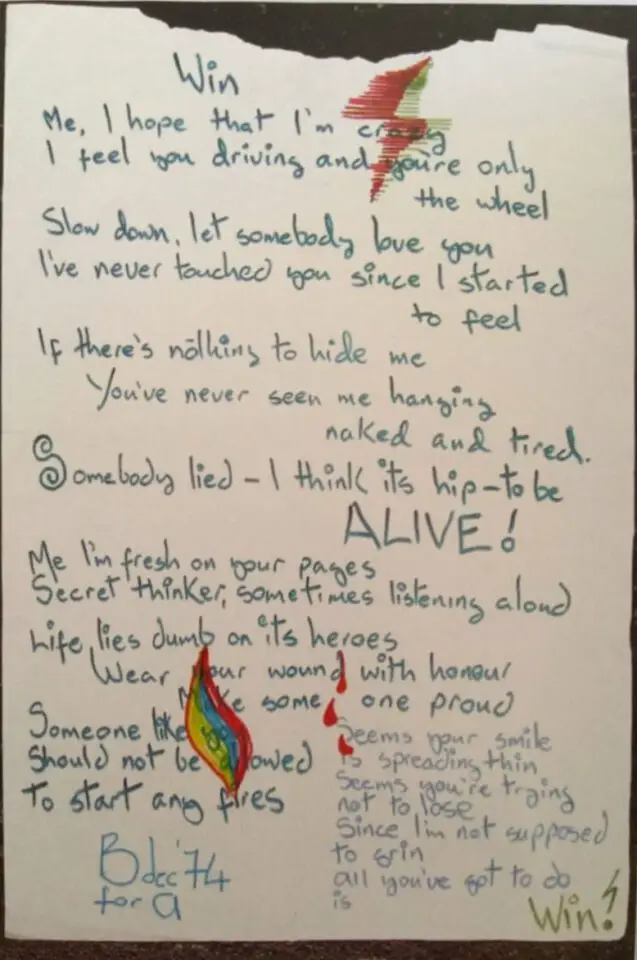 Written by: David Bowie
Written by: David Bowie
Recorded: December 1974
Producers: Tony Visconti, Harry Maslin
Released: 17 February 1975
Available on:
Young Americans
Personnel
Contents
Carlos Alomar: electric guitar
Mike Garson: Fender Rhodes
David Sanborn: alto saxophone
Emir Ksasan: bass guitar
Andy Newmark/Dennis Davis: drums
Larry Washington: congas
Luther Vandross, Ava Cherry, Robin Clark, Diane Sumler, Anthony Hinton: vocals
Additional musicians: strings
The lush ballad ‘Win’ was the second song on Young Americans, David Bowie’s 1975 album inspired by American soul music.
‘Win’ was a ‘Get up off your backside’ sort of song really – a mild, precautionary sort of morality song. It was written about an impression left on me by people who don’t work very hard, or do anything much, or think very hard – like don’t blame me ’cause I’m in the habit of working hard.You know, it’s easy – all you got to do is win.
New Musical Express, August 1975
Although Bowie later described the album as “plastic soul”, ‘Win’ is perhaps the closest it came to approximating the sound of Philadelphia soul.
There was no point doing a straightforward take on American soul music because that had been done already. I just wanted to put this spin on it. And even the tunes themselves, you couldn’t really envisage any American soul artist doing any of those songs. But they paid homage to the soul sound. Things like ‘Somebody Up There Likes Me’, the format of it isn’t straight rhythm and blues at all by any means. Things like ‘Win’, the chord structures are much more of a European thing than an American thing. But it imbued the muscular qualities of soul music pretty accurately, and I got these pretty heavyweight American musicians working on it. It gave it some sound of a kind of a fake authenticity to it. It really was a plastic soul album.
The David Bowie Story, BBC Radio 1
Bowie included ‘Win’ on iSelect, a compilation of his lesser-known songs that was released in 2008.
This is not, you may be speechless to learn, an ode to Winifred Atwell, though I almost wish it were for she was a real winner. In the Fifties in England it was virtually impossible for a ten-year-old to hear boogiewoogies and rags unless our Winifred was playing them on her ‘other’ piano.At home in Trinidad she’d been brought up with blues and R&B and had played it for the American GIs who were based at what is now the main airport. Winnie was the first black artist in Britain to sell one million records. She was tops.
No, this song is about, er, winning. David Sanborn is on sax. He was experimenting with sound effects at the time and I’d rather hoped he would push further into that area, but he chose to become rich and famous instead. So he did win really, didn’t he?
Mail Online
With its switches between 6/8 and 4/4, the song’s chorus shows the complexity of Bowie’s songwriting and the dexterity of his hired musicians.
There was jamming of ideas, but not with everybody. We would do a certain amount of arrangements with guitar, bass and drums and then you would consider an invited guest like keyboards and electric lead guitar. Then after that you would do background vocals and after that lead vocals.That’s the way the sessions went, like that, calm. ‘Somebody Up There Likes Me’, ‘Win’… everything has its place. And, the development of it, Bowie would say, ‘Let’s not put that part in yet – let’s wait.’ So there would be an introduction, the instruments come in. Bowie doesn’t want to hear the same thing in the beginning as at the end – there has to be some development in the song. His ear is acute to the development of the song and he wants the people that will give him the potential for development.
David Bowie: Ultimate Record Collection (Uncut)
Bowie composed ‘Win’ during the Soul Tour in late 1974. During some performances of ‘Rock ‘N’ Roll Suicide’ he sang “All you gotta do is win!”, as heard on the 2020 album I’m Only Dancing (The Soul Tour 74).
The earliest known live performance of ‘Win’ was from the final date of the Soul Tour, at Atlanta’s Omni Coliseum on 1 December 1974. Although Bowie never returned to the song in concert, it was rehearsed in 2003 for A Reality Tour, and performed occasionally at soundchecks.
Bowie’s original handwritten lyrics for ‘Win’ were written in December 1974, and bear the dedication “for a”, presumably Ava Cherry. They also contain one key difference from the final recording: “Then you’ve never seen me hanging naked and tired” was subsequently changed to “naked and wired”.


Luther Vandross and all the background singers crooning “….It ain’t over!” totally makes me believe that it ain’t over. Just magical refrain by them in a sweet song.